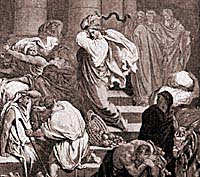 |
 |
 There
are two dominant positions on war that conscientious Christians have
embraced throughout Christian history. There are variations on each,
but, for the sake of brevity, this answer will focus on the two main
views and explain them in general terms: Pacifism versus Just War Theory. There
are two dominant positions on war that conscientious Christians have
embraced throughout Christian history. There are variations on each,
but, for the sake of brevity, this answer will focus on the two main
views and explain them in general terms: Pacifism versus Just War Theory.
The pacifist tradition
Definition: A pacifist is someone who believes that under no circumstances is war justified.
This position has a long history in America and as well as throughout
the Church. It dominated Christianity during the Church’s first 300
years. Early Christians perceived two roadblocks that prohibited a
devout believer from joining the military, voluntarily or involuntarily.

- In order to become a soldier in the Roman
army, one had to offer a sacrifice, swearing an allegiance to
Caesar—swearing ultimate allegiance to him as a god. Of course, all
Christians agreed that this was not possible for a devout believer. So
believers were prohibited from joining the military, based on this
requirement.
- Soldiers may be called upon to pick up the sword and use it. Many
Christians believed that this too was against the teachings of Christ.
Here is a sample of what some early Church Fathers said about joining the military:
Justin, who was martyred for his faith, wrote:
“We refrain from making war on our enemies, and [we] cannot bear to see a man killed, even if killed justly.”
Clement of Alexandria wrote in 217 A.D.:
“He who holds the sword must cast it away and that if one of the faithful becomes a soldier, he must be rejected by the Church, for he has scorned God.”
Tertullian, in the early third century A.D. makes this statement:
“For even if soldiers came to John and received advice on how to act, and even if a centurion became a believer, the Lord, in subsequently disarming Peter, disarmed every soldier” (Treatise on Idolatry 19; Ante-nicene Fathers 3:73).
Tertullian is referring to the incident where Peter attempted to defend Christ in the garden of gethsemane. Jesus
halted him, forbidding him to take up the sword against those
attackers. He tells Peter that he who lives by the sword will die by the
sword. Tertullian and many Church fathers saw this as a model for all
Christians—that none are given the right to pick up the sword.
In the Canon of Discipline, a third century document, it was
said that Christian soldiers should not be taught to kill, and if they
were, they must refuse to kill, even upon command by their officers. To
do otherwise would bring Church discipline.
Here are the major elements of the strict pacifist viewpoint, based upon their interpretation of Scripture:
- According to pacifism, war is inconsistent with the law of nonresistance preached and modeled by Jesus Christ. The pacifist tradition is based on its interpretation of part of the Sermon on the Mount. Jesus said:
“You have heard that it was said, ‘An eye for an eye, and
a tooth for a tooth.’ But I say to you, do not resist an evil person;
but whoever slaps you on your right cheek, turn the other to him also” (Matthew 5:38-39).
 This
is the “law of nonresistance.” Following Christ’s command to turn the
other cheek, many pacifists believe that it is better to suffer violence
than it is to commit violence. They believe this was taught by Jesus,
and modeled by Him in the words of Peter: This
is the “law of nonresistance.” Following Christ’s command to turn the
other cheek, many pacifists believe that it is better to suffer violence
than it is to commit violence. They believe this was taught by Jesus,
and modeled by Him in the words of Peter:
“For you have been called for this purpose, since Christ
also suffered for you, leaving you an example for you to follow in His
steps” (I Peter 2:21).
Pacifists have said that our obligation as believers is to follow the
example of Jesus who turned the other cheek—and did not return evil for
evil. They say we are to “resist not evil” (Matthew 5:39).
They interpret this to mean that we are never to resist evil under any
circumstances or under any conditions. Just as Christ did not retaliate
against violence, but rather he suffered on the cross taking suffering
to Himself and snuffing it out. The pacifist sees the death of Christ
(an innocent victim in the face of injustice) as a pattern for all
Christians to follow.
- Pacifists believe that war is inconsistent with the ethic of love. Again, quoting from Jesus in the Sermon on the Mount:
“You have heard that it was said, ‘You shall love your
neighbor and hate your enemy.’ But I say to you, love your enemies and
pray for those who persecute you” (Matthew 5:43-44).
Pacifists say, “Jesus called us to love
our enemy, not take up arms against him. We are to pray for those who
persecute us. We are to turn the other cheek. We are not to resist evil,
but to allow love to overcome evil.” Mennonite Pacifist Myron
Augsburger asked, “How can we kill another human being for whom Jesus
died? How can we adopt the attitude that ‘Jesus loves you, but I’m
afraid I’m going to have to kill you?’”
Objections to the pacifist interpretation of Scripture
- WAS JESUS REALLY A PACIFIST? A comprehensive study proves that He was not.

- In John 2:14, Jesus comes to the Temple and finds people selling “oxen and sheep and doves, and the money changers seated at their tables.” Jesus sees that the religious leaders have turned this, His father’s house of prayer,
into a marketplace. Instead of prayers and supplications, there is the
noise of commerce. Jesus is burning with anger and indignation. The zeal
for His father’s house consumes Him.
“And He made a scourge
of cords, and drove them all out of the temple, with the sheep and the
oxen; and He poured out the coins of the money changers and overturned
their tables” (John 2:14-15).
This was a physically violent response on the part of Jesus. This
makes it abundantly clear that Jesus was not a strict pacifist. The
Bible is also clear that Jesus was sinless. Even in this situation, he did nothing wrong.
- In Luke 22:36-38, Jesus is preparing His disciples for His departure. He knows that the Jewish
leaders are decidedly against Him. In the past, when He sent His
disciples out, He took care of all their needs. But now things are going
to change.
“And He said to them, ‘But now, whoever has a money belt is to take it along, likewise also a bag, and whoever has no sword is to sell his coat and buy one.
For I tell you that this which is written must be fulfilled in Me, ‘And
he was numbered with transgressors;’ for that which refers to Me has
its fulfillment.’ They said, ‘Lord, look, here are two swords.’ And He said to them, ‘It is enough.’”
What is the context here? When traveling from city to city, people of that day often had to carry a sword in order to fend off robbers.
Jesus told His followers that He was going to send them out there, and
warned them to be prepared to defend themselves when appropriate.
Clearly, Jesus was not a pacifist.
- In the book of Revelation, there is a stronger example. Here is a portrait of Jesus, the warrior king. Here the elements of love and justice come together. Love and war can go together, if it is done on behalf of good.
And I saw heaven opened, and behold, a white horse,
and He who sat on it is called Faithful and True, and in righteousness
He judges and wages war. …From His mouth comes a sharp sword, so that
with it He may strike down the nations, and He will rule them with a rod
of iron; and He treads the wine press of the fierce wrath of God, the Almighty (Revelation 19:11, 15).
This is no meek and mild Jesus. This is not a pacifist. This is the mighty warrior, the God of love, who comes to wage war against his evil enemies. The imagery is graphic. It describes Him as treading the wine press, destroying His enemies as their blood spills over on His robes. Love and the pursuit of justice are not contradictory. They can go hand in hand.
| Standing by and refusing to act while harm befalls a neighbor is not a virtue; it is a vice. |
John Calvin emphasized that a Christian soldier should never use
force to gain self-advantage, but “use force out of love for thy
neighbor.” Standing by and refusing to act while harm befalls a neighbor
is not a virtue; it is a vice.
As someone else has said, “War can be a means to a just peace, and to break an unjust peace.”
Jesus was not a pacifist, nor was He a hawk. It is interesting that
Jesus makes everyone uncomfortable, because He can never be put in
anybody’s box. He said blessed are the peacemakers. Jesus wasn’t a hawk.
He wasn’t a pacifist. He wasn’t a Republican. He wasn’t a Democrat. He
wasn’t an American. He wasn’t an Iraqi. He transcends all categories.
- PRIVATE VS. PUBLIC ROLES – Pacifists fail to make a clear distinction between a Christian’s private and public views. In Romans 12-13 we find Paul’s
explanation of the role of the Christian and the State. Here he lays
out some fine distinctions between how were are to conduct ourselves
privately and publicly—how we are to manage our person, and how we are
to manage our office.
In Romans 12:17-21, Paul
lays out the responsibility of the Christian INDIVIDUAL. “Never pay
back evil for evil to anyone. If possible…” Notice the qualifier, “if
possible.”
“If possible, so far as it depends on you, be at peace with all men.”
What is Paul saying? There will be times when you cannot be at peace
with all men. But when it is possible, when it depends on you, as an
individual, strive for peace.
“Never take your own revenge, beloved, but leave room for
the wrath of God, for it is written, ‘Vengeance is mine, I will repay,’
says the Lord. But if your enemy is hungry, feed him, and if he is
thirsty, give him a drink; for in so doing you will heap burning coals
on his head. Do not be overcome by evil, but overcome evil with good.”
These are words very similar to those of Jesus. Verse 17 and 21
are saying the same thing: Never pay back evil for evil, and overcome
evil. These two verses act like bookends in the text—one at the
beginning and the other at the end. Everything between these two
bookends supplies the definition and context for what Paul means when he
says “evil.”
What is evil? Don’t take your own revenge; that is evil.
Why is it evil? Because you are usurping the prerogative of God who
alone has the wisdom to know when retribution ought to be enacted. God
is to be the judge,
and God’s ministering authority, the State. Individuals should not take
matters into their own hands. That is God’s job. To do otherwise is to
usurp God’s right and to usurp the right of the State.
So, the evil that Paul,
and I believe Jesus, had in mind to resist here is the evil of personal
vengeance. The Scriptures are forbidding us from taking personal
revenge. That is a lot different than forbidding us to pursue justice.
Revenge no; justice yes.
It is no coincidence that Paul follows this passage dealing with the
Christian’s private response to evil with a Christian’s public response
to evil. In chapter 13:1-4, we see the role of the State.
“Every person is to be in subjection to the governing
authorities. For there is no authority except from God, and those which
exist are established by God. Therefore whoever resists authority has
opposed the ordinance of God; and they who have opposed will receive
condemnation upon themselves. For rulers are not a cause of fear for
good behavior, but for evil.
Do you want to have no fear of authority? Do what is good and you
will have praise from the same; for it [government; the State] is a
minister of God to you for good. But if you do what is evil, be afraid;
for it does not bear the sword for nothing; for it is a minister of God,
an avenger who brings wrath on the one who practices evil.”
 What is Paul
saying? He is building an argument. First of all, government is
established by God. As a minister of God, it acts as an avenger to
promote good and to punish evil (some translations say “evildoers”).
Essentially, the role of government is to promote justice. What is Paul
saying? He is building an argument. First of all, government is
established by God. As a minister of God, it acts as an avenger to
promote good and to punish evil (some translations say “evildoers”).
Essentially, the role of government is to promote justice.
As individuals, we are not to seek personal
vengeance. We need to be willing to suffer injustice as Christians, and
make an appeal to our God and to our State. We are to entrust ourselves
to God.
But, as members of the State, we are to work for justice against evil, for the sake of others and of society.
That creates a tension for many Christians, trying to understand when
is the right time to turn the other cheek. John Stott put it this way,
“If my house is burglarized one night and I catch the
thief, it may well be my duty to sit him down and give him something to
eat and drink, while at the same time telephoning the police.”
We have a private responsibility and duty, and we have a public one.
Conclusion about pacifism
 Ever since Adam,
the world has been in a war between good and evil. For this reason, the
pacifist position is unrealistic. When taken to its logical conclusion,
it would virtually do away with courts and police departments. It would
ultimately lead to anarchy due to the nature of human hearts. Ever since Adam,
the world has been in a war between good and evil. For this reason, the
pacifist position is unrealistic. When taken to its logical conclusion,
it would virtually do away with courts and police departments. It would
ultimately lead to anarchy due to the nature of human hearts.
Pacifism is also unbiblical, because it does not take the whole counsel of Scripture.
It does not separate a Christian’s private duties from his public
duties, and the role of the State versus the role of the individual.
The Just War Theory
Just War Theory is the other dominant position held by many
Christians. This position was first formulated by Augustine of Hippo and
later refined by Thomas Aquinas. It is based on the following
assumptions:
- War is never good. But it is sometimes necessary. Why? Because sin is an ever present reality that has to be dealt with.
“What is the source of quarrels and conflicts among you?
Is not the source your pleasures that wage war in your members? You lust
and do not have; so you commit murder” (James 4:1-2).
At the forefront of much war and conflict is an idolatry that says, “I want more. I want what you have.” And so there are wars and rumors of wars. Much of it is rooted in human sin. Political parties and institutions are not evil in themselves. Evil is ultimately rooted in every human heart.
- Necessary wars are to be conducted within the limits of justice.
The purpose of Just War Theory is to give us a common terminology, so
that nations that wage war will operate within certain parameters that
are just.
As Christians, we need to be realistic, not naive. We need to get
past the common white hat versus black hat assumptions about war. When
it comes to war, there is rarely pure good versus pure bad. There are
usually gray hats versus gray hats, with different shades of gray. We
are all guilty sinners. The hope of Just War Theory is that by applying
just principles we can be as righteous as one can be when it comes to
waging war.
- Only governments, and not individuals, have the right under God to carry out retribution.
This rules out terrorists. They have no authority to do what they do.
Within Just War Theory there is a seven-fold criteria.

- There must be a just cause. All aggression is
condemned in Just War Theory. Participation in war must be prompted by a
just cause or a defensive cause. No war of unprovoked aggression can
ever be justified.
Preemptive war can be legitimate in some circumstances, according to
Just War Theory, if it is known that a grave act of aggression is
imminent. If a government knows that their nation or another is about to
become a victim, it can act to prevent the injustice before it takes
place.
- Just intention. The war must have a right intention
to secure a fair peace for all parties involved. One must have just
motives for going into war.
- It is a last resort. Other means of resolution such as diplomacy and economic pressure must have been reasonably exhausted before war.
- Formal declaration. The war must be initiated with
formal declaration by a properly constituted authority. Only governments
can declare war, not individuals or militias or terrorist
organizations—only governments.
- Limited objectives. Securing peace is the purpose
and objective in going to war. War must be engaged in such a way that
when peace is attained, hostilities cease.
- Proportionate means. Combatant forces of the opposition may not be subjected to greater harm than is necessary to secure victory and peace.
- Noncombatant immunity. Military forces must respect individuals and groups not participating in the conflict and must abstain from attacking them.
Conclusion
Based on my studies, a strict pacifist position is not only
unreasonable, it is unbiblical. The presence of sin in the world means
that is is sometimes regrettably necessary to use force in order to
secure justice for the innocent and the helpless. However, when war is
considered, its legitimacy must be carefully evaluated.
 In
doing so, Christians should remember that their ultimate allegiance is
not to the State; it is to the commands of God. Unfortunately, history
shows that individual Christians and churches have rarely stood up
effectively against the State when the war is unjust. It is too easy for
people to get caught up in patriotism. It is all too easy to buy into
nationalistic interests. People are often so close to the situation that
they cannot objectively judge the legitimacy of taking action against
another nation. That failure was evident in Nazi Germany, where the
Church became a lapdog to the State. Yes, there were those who stood
against it in defiance, but most did not. The Church also failed in
Constantine’s Rome. In
doing so, Christians should remember that their ultimate allegiance is
not to the State; it is to the commands of God. Unfortunately, history
shows that individual Christians and churches have rarely stood up
effectively against the State when the war is unjust. It is too easy for
people to get caught up in patriotism. It is all too easy to buy into
nationalistic interests. People are often so close to the situation that
they cannot objectively judge the legitimacy of taking action against
another nation. That failure was evident in Nazi Germany, where the
Church became a lapdog to the State. Yes, there were those who stood
against it in defiance, but most did not. The Church also failed in
Constantine’s Rome.
Yes, there are times when war is just. We must be careful to step
outside of nationalistic thinking and critique our nations so that we
can be faithful to God, before our State, and then act according to our
conscience.
Remember, God is sovereign. The nations rage, but God has established His King on Mount Zion.
He has given Him an inheritance which is the whole world. And there
will come a day when we will take our swords and craft them into
plowshares. We will learn war no more. Come quickly Lord Jesus!
Author: John Salvatore, Faith Church of the Valley. The Just War
Theory section of this article was adapted from an article by Commander
Timothy J. Demy, Th.D. and Th.M. (Dallas Theological Seminary), Chaplain
Corps, U.S. Navy.
Copyright © 2003, Faith Church of the Valley, Chandler, Arizona. All Rights Reserved – except as noted on attached “Usage and Copyright”
page that grants ChristianAnswers.Net users generous rights for putting
this page to work in their homes, personal witnessing, churches and
schools.
www.ChristianAnswers.Net |


 There
are two dominant positions on war that conscientious Christians have
embraced throughout Christian history. There are variations on each,
but, for the sake of brevity, this answer will focus on the two main
views and explain them in general terms: Pacifism versus Just War Theory.
There
are two dominant positions on war that conscientious Christians have
embraced throughout Christian history. There are variations on each,
but, for the sake of brevity, this answer will focus on the two main
views and explain them in general terms: Pacifism versus Just War Theory.

 Ever since Adam,
the world has been in a war between good and evil. For this reason, the
pacifist position is unrealistic. When taken to its logical conclusion,
it would virtually do away with courts and police departments. It would
ultimately lead to anarchy due to the nature of human hearts.
Ever since Adam,
the world has been in a war between good and evil. For this reason, the
pacifist position is unrealistic. When taken to its logical conclusion,
it would virtually do away with courts and police departments. It would
ultimately lead to anarchy due to the nature of human hearts.
 In
doing so, Christians should remember that their ultimate allegiance is
not to the State; it is to the commands of God. Unfortunately, history
shows that individual Christians and churches have rarely stood up
effectively against the State when the war is unjust. It is too easy for
people to get caught up in patriotism. It is all too easy to buy into
nationalistic interests. People are often so close to the situation that
they cannot objectively judge the legitimacy of taking action against
another nation. That failure was evident in Nazi Germany, where the
Church became a lapdog to the State. Yes, there were those who stood
against it in defiance, but most did not. The Church also failed in
Constantine’s Rome.
In
doing so, Christians should remember that their ultimate allegiance is
not to the State; it is to the commands of God. Unfortunately, history
shows that individual Christians and churches have rarely stood up
effectively against the State when the war is unjust. It is too easy for
people to get caught up in patriotism. It is all too easy to buy into
nationalistic interests. People are often so close to the situation that
they cannot objectively judge the legitimacy of taking action against
another nation. That failure was evident in Nazi Germany, where the
Church became a lapdog to the State. Yes, there were those who stood
against it in defiance, but most did not. The Church also failed in
Constantine’s Rome.
 This
is the “law of nonresistance.” Following Christ’s command to turn the
other cheek, many pacifists believe that it is better to suffer violence
than it is to commit violence. They believe this was taught by Jesus,
and modeled by Him in the words of Peter:
This
is the “law of nonresistance.” Following Christ’s command to turn the
other cheek, many pacifists believe that it is better to suffer violence
than it is to commit violence. They believe this was taught by Jesus,
and modeled by Him in the words of Peter:
 What is
What is
No comments:
Post a Comment